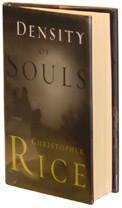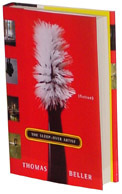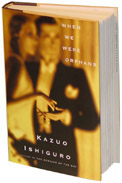|
Kazuo Ishiguro's prose is controlled but powerful. No postmodern frills, just straight-on realism in an understated style. Every aspect of his latest novel whispers confidence. Written in seven contemporaneous vignettes, Ishiguro's narrator, Christopher Banks, navigates London's upper crust with stultifying British reserve. A celebrated "Sherlock" in inter-war 1930's Britain, Banks grew up in the international settlement in Shanghai, having come to England for the first time as a sort of orphan after his parents' strange disappearance, an assumed kidnapping. His life in London has a traumatized aspect to it, burdened as he is by the past, and after great success in celebrated cases he returns to Shanghai with the deluded expectation that he will, so many years later, crack the case and free his parents from their bondage. Portions of the story recount Banks' happy childhood, and become a little tedious. Ishiguro, in fact, in his confidence, strings his reader along for a good portion of the book, revealing little in the way of detail as to what actually happened all those years ago. But as it turns out, it's all painstaking preparation for a whopper of a climax that would fall flat without it. When We Were Orphans has a symbolic - almost allegorical - air about it; the sort of novel, like Conrad's Heart of Darkness, that speaks eloquently to the condition of the human heart; the sort of novel that will leave its readers muttering, "The Horror! The Horror!" -Todd Wright
 A DENSITY OF SOULS A DENSITY OF SOULS Christopher Rice Talk Miramax Books
Some debut novels are the toils of painful years of writing, becoming both realized dreams and sighs of relief for their expended authors. Some debut novels are little more than transparent attempts, as their authors meander around the plot and characters for 300 pages, never quite getting the vehicle to shift into gear. And some debut novels are masterpieces. Such is the case with A Density of Souls, the first novel from Christopher Rice, the 22-year-old son of poet Stan Rice and novelist Anne Rice of Interview with the Vampire fame. Although comparisons with his bestselling mother are inevitable, Rice takes his own place in the literary world with a book that is suspenseful, touching, and unique. In A Density of Souls, Rice explores the complicated relationships of a group of four teenagers coping with the cruelties of life and the cruelties of each other. The tragic hero is Stephen Conlin, a gay teenager who, like many gay kids, is forced to deal not only with his own sexuality but with the ignorance and prejudice of others. Such feelings of hate manifest themselves in Stephen's life through the savageness of teenage passion turned violence. But this is more than just another dark bildungsroman; spanning eight years, it is a compact epic about the ties of family, the complexity of all relationships, and the daunting task of self-acceptance. Through carefully constructed details and a mixture of poetic and at times harshly realistic prose, Rice paints a world that is rich with life, death, and the prospect of renewal. -Victor Maze
 THE SLEEP-OVER ARTIST THE SLEEP-OVER ARTISTThomas Belle Norton
"If there is anything worse than having just been fucked by a man wearing two socks, it is having just been fucked by a man who is falling asleep while wearing only one." And so we are introduced to the New York City world of easy-living and revolving relationships in Thomas Beller's novel, The Sleep-Over Artist. Beller follows Alex Fader from the 10-year old boy who loses his father to the 20-something young man still learning about maturity, commitment and stable employment. Beller chronicles Alex's stints from throwing water balloons out of his buddy Walker's apartment window to getting drunk at Phil Singer's Bar Mitzvah, to his numerous relationships with women. Alex moves through Tania, the adolescent infatuation, to Christine, Melissa and finally, Katrina. Though Beller succeeds admirably in pulling readers into each individual narrative, the book feels like a collection of stories rather than a novel, sometimes resulting in a slower pace. Regardless of this however, Beller whimsically lures readers into a fantasy life - where one can have anyone they choose, support themselves without working and take spontaneous transcontinental vacations. Way to go Thomas Beller, please, take us by the hand once again and lead us into another fantasy full of carefree days and sex with our socks on. -Christina Dwiggins
|
||
|
|
 WHEN WE WERE ORPHANS
WHEN WE WERE ORPHANS